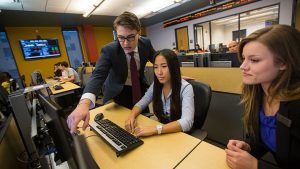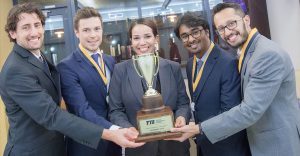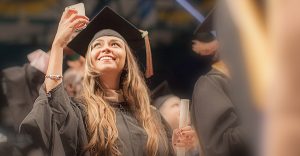“I visited Peru the day that Alejandro Toledo assumed the presidency in 2001,” said Victoria Kenny (MA ’06), coordinator, USAID Farmer-to-Farmer Program for the College of Business Administration. “I remember seeing his picture on that day, dressed in indigenous clothing. It made an impression on me, as did the poverty I saw around me in the little town where I was supposed to be on vacation.”

Kenny was one of nearly 100 people to attend a Special Event Herbert A. Wertheim Lecture given by Toledo in the MARC Pavilion on October 16, 2006. Chapman School Dean José de la Torre, who knows Toledo and was able to bring him to the campus, made a detailed introduction to the assembled guests: corporate partners, students from the Latin American and Caribbean Center (LACC), Executive MBA and Master of International Business (MIB) students, and many area Peruvians. Toledo, whose term as president ended this year, spoke at length on the topic, “Economic Stability and Democracy in Latin America,” and then fielded questions.
“A number of the members of the Chapman School’s Latin America Forum also were present,” said Natalia Sol, director of corporate relations, whose office coordinated the event. “These individuals are chief executive officers for Latin América—or their equivalents—or for major multinational corporations, and much of what Toledo said was directed at their concerns.”
Toledo personalized the issue of poverty.
The heart-wrenching poverty Kenny witnessed in Peru was a theme echoed in Toledo’s talk.
“His message was, if you want to make a difference, do something for poor people,” said Maria José Monti, director, Global Transaction Services for Citigroup and a member of the EMBA Advisory Board, who is from Argentina. “He said, if you work in a democracy, you need to avoid or change poverty because poverty doesn’t help anyone, and I agree.”
Toledo’s own experience provides a dramatic example of both poverty and personal success in overcoming it. One of sixteen children—seven of whom died because of poor nutrition—he was the son of a bricklayer and a fishmonger. As a child, he worked as a shoeshine boy. After studying at the local state school, G.U.E. San Pedro, he received a one-year scholarship to the University of San Francisco, completed his bachelor’s degree in economics by obtaining a partial soccer scholarship and by working part-time pumping gas, and went on to receive two master’s degrees and a PhD from Stanford University.
“He defined himself as a statistical error,” Monti said, and Kenny recalled that he explained that he was “very fortunate, being the one in a million who had a chance.”
Talk weaves the personal and the political.
“What he said about democracy and stability really impressed me,” Kenny said. “I had a concentration in international business when I got my degree in Latin American studies; I am interested in whatever has to do with Latin America and democracy and progress in that region.”
“His personal testimonial is what struck me,” Monti said. “It was powerful to see a person born into such poverty who developed himself. He helped us realize that people from government and companies can work together to reduce poverty, and that if companies see poverty as a market, they can still make money. Also, it was good to listen to a political leader who shows balance, someone who is not a demagogue.”




